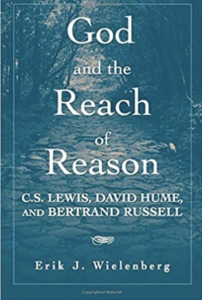
God and the Reach of Reason: C. S. Lewis, David Hume, and Bertrand Russell
Having crossed paths with many well-known philosophers, such as Gilbert Ryle,1 Antony Flew,2 C. E. M. Joad,3 Fredrick Copleston,4 Basil Mitchell,5 George Grant,6 and A. J. Ayer,7 and having written a few fairly impressive philosophical books, such as The Abolition of Man and Miracles, one would have thought that C. S. Lewis would have received his due as a philosopher long ago. But only over the past five years or so has this happened. To begin with, there was Victor Reppert’s C. S. Lewis’s Dangerous Idea (2003), which was followed subsequently by French philosopher Iréne Fernandez’s C. S. Lewis – Mythe, Raison Ardente (2005) and Gregory Bassham and Jerry L. Walls’ The Chronicles of Narnia and Philosophy: TheLion, the Witch, and the Worldview (2005). After these came the third volume of Bruce Edwards’ C. S. Lewis: Life, Works and Legacy;Apologist, Philosopher, & Theologian (2007) and the reissued, revised edition of John Beversluis’ C. S. Lewis and the Search for Rational Religion (2007). Finally, in 2008, we have seen the publication of more books on Lewis and philosophy than ever before: David Baggett, Gary Habermas and Jerry Walls’ C. S. Lewis as Philosopher, my own C. S. Lewis and Philosophy as a Way of Life: A Comprehensive Historical Examination of His Philosophical Thoughts, and Erik Wielenberg’s God and the Reach of Reason: C. S. Lewis, David Hume and Bertrand Russell – the book I want to concentrate on in this review.
God and the Reach of Reason is Wielenberg’s second book, and, as in his first book, Value and Virtue in a Godless Universe, Wielenberg proves himself once again to be a clear writer and an honest intellectual, who, despite disagreeing with most of C. S. Lewis’ philosophy, treats Lewis (and his other interlocutors, Hume and Russell) with respect, unlike John Beverslusis, the author of the other major book that deals with, and rejects, Lewis’ philosophy. Although God and the Reach of Reason is in principle focused on Lewis’, Hume’s and Russell’s philosophy of religion, Wielenberg himself admits that he is more concerned with Lewis’ philosophy than anything else (6).
The book itself is divided into four main chapters, which discuss 1) the problem of evil,2) three arguments for the existence of God, 3) miracles and the Trilemma, and 4) the relationship between faith and reason, the argument from design, the relationship between church and state, and so on. While it is impossible to get into any great detail here, I would like to comment on each of these chapters briefly.
In Chapter 1, Wielenberg does a good job explaining what the problem of evil is, and then demonstrates a decent knowledge of Lewis’ thoughts on this matter. However, ultimately Wielenberg rejects Lewis’ argument – not to mention a supplemented Lewisian argument – because he thinks that neither Lewis nor any Christian can account adequately for what he calls “non-victim improving natural child suffering” (53). While I admire the seriousness that Wielenberg conveys in his examination of this problem, I think he fails to appreciate how a number of Christians, including Lewis, have understood “natural” evil. That is, the “natural” evil that many innocent children suffer, such as a disease or a tsunami, often has been understood as the result of free actions by higher spirits. Thus, as Lewis pointed out in The Problem of Pain, if God were to overrule all such free actions – even when great evil is the result (as in the case of the non-victim improving suffering of the child) – He would essentially be negating His greatest creation: free will. Of course, it is true that God can, and does, overrule some such actions, but for Him to do this all the time would be for Him to act against the very purpose of His creating in the first place: to make persons who choose to follow Him out of their own free wills. Consequently, without thwarting His own design, God cannot stop all such evil. And besides, who is to say that God will not give children who suffer and die without any moral betterment another chance – in a different way – to love Him freely?
In Chapter 2, Wielenberg examines three arguments for the existence of God: the moral argument, the argument from reason, and the argument from desire. Wielenberg’s discussion of the moral argument is the least convincing section of the book for a number of reasons. First, citing Lewis’ early diary, Wielenberg claims that it is possible to pursue evil for its own sake (72). However, while it is true that the early Lewis – to be specific, Lewis during his third philosophical phase – stoical materialism – rejected eudaimonism, later the Oxford don came to see that all free-willed creatures pursue their own happiness (i.e. the good as they see it) necessarily, even if most of them mistake the real object of their happiness or good. Hence, I agree with the mature Lewis against Wielenberg that it is an “absurd fancy” to imagine that “devils are engaged in the disinterested pursuit of something called Evil.”8 Second, as an extension of his argument in Value and Virtue in a Godless Universe, Wielenberg argues against Lewis, saying that metaphysical naturalism is not inconsistent with the existence of objective moral values (87). His claim is that objective moral values are the same as logical truths and that somehow evolution has brought us into contact with these (which Wielenberg claims simply exist but does not give us any explanation of their ontological status in regard to naturalism). Needless to say, it is here that I find Wielenberg’s argument sorely lacking, and feel that for all his honesty, Wielenberg misjudges the evidence that Lewis presents in his moral argument.
Wielenberg’s discussion of the argument from reason and the argument from desire are better, but in both cases I have a few complaints. First, in his discussion of the argument from reason, he does not spend nearly enough time grappling with Victor Reppert’s book and numerous articles on this issue. As a result, I could not help but feel that Wielenberg’s thoughts on this matter were incomplete and tentative at best; moreover, while Wielenberg admits that the argument from reason, which he says is an argument claiming that metaphysical naturalism cannot account for intentionality, is a problem for naturalism, he has faith (blind faith?) that one day naturalism will be able to account for this and he says that naturalism’s faith in this regard is the same as Christianity’s faith in regard to the existence of evil (108). Yet, as I have pointed out, I do not agree with Wielenberg that Christianity cannot account for evil in a convincing way, and so I do not think that Wielenberg’s neutralization argument works. Second, while I agree with Wielenberg when he claims that all people have an innate desire for something which lies beyond the natural world (this being the first premise in the argument from desire), I find it odd that he could admit this and then deny that such innate, natural desires can be satisfied (119). Hence, once again I feel that his powers of judgment are not as sharp as they could be, for he says that the evidence for God’s existence and life’s absurdity is the same in this regard.
In Chapter 3, Wielenberg discusses both miracles and the Trilemma. While he rightly points out a few minor problems with how Lewis formulated his argument for miracles, Wielenberg’s rejection of Lewis’ argument for miracles depends largely on his prior rejection of Lewis’ argument from reason, which I do not think Wielenberg dealt with adequately (136). While Wielenberg thinks that those who argue for miracles need to account for the uniformity of nature and the probability principle, it is precisely those who argue against miracles who need to account for these since if there is neither uniformity nor a standard by which probability can be measured, then a miracle is quite literally no stranger than anything else and hence it is ridiculous to argue against miracles. Finally, while I agree with Wielenberg that the Trilemma – that Jesus was either liar, lunatic or Lord – is a weak argument, I find it somewhat annoying (and here I am probably just being pedantic) when people refer to it continuously as “Lewis’s famous Trilemma,” for it was G. K. Chesterton, and not C. S. Lewis, who formulated this argument originally (149).
Finally, in Chapter 4, Wielenberg discusses a handful of different issues, including the relationship between faith and reason, the argument from design, the relationship between church and state, and so on. In regard to faith and reason, Wielenberg gets Lewis right when he says that the Oxford don was a qualified evidentialist (164). Nevertheless, I would have liked a much deeper discussion of Lewis’ different types of faith (faith as trusting what you know is most probable and faith as a gift) and also how these relate to the deliberative imagination, which is the source of mythical inspiration according to Lewis. As for the argument from design, Wielenberg is again correct when he points out that Lewis found this argument wanting (182). However, instead of moving on to the next issue quickly, Wielenberg should have pointed out that when Lewis rejected this argument – in the 1950s – it was a weak argument, but nowadays it is perhaps the most powerful argument for the existence of God as witnessed by the recent theistic/deistic conversion of the great atheistic philosopher Antony Flew.9 Lastly, in regard to the relationship between church and state, Wielenberg points out (again rightly) that Lewis disapproved of a strong connection between church and state (200). Nonetheless, like most Lewis scholars, Wielenberg does not give us a clear idea of how all of Lewis’ political views can be reconciled. On my account we may sum up his views as follows: on the one hand, Lewis loved and valued ontological hierarchy with its proportionate equality and rich mythical meaning; however, on the other hand, he was skeptical of the abuses that came with such on a political level, given the fallen nature of man. Thus, Lewis’ entire political agenda was to navigate between these two factors. His solution was something like a democratic or even a quasi-socialist system which would maintain its ceremonial monarchy to nourish the people spiritually, and whose rulers would seek to draw out the unique essence of the nation but would do so with prudence, courage, temperance and justice mixed with mercy.
In conclusion, even though I disagree with most of Wielenberg’s opinions and find his knowledge of Lewis wanting in some places, God and the Reach of Reason is an accessible book, which is clearly written and easy to follow, and so I would recommend it to those interested in natural theology and especially those interested in Lewis and philosophy. Incidentally, with so many books about Lewis and philosophy being published at the moment, some might wonder what the major differences are between these. While my own book, C. S.Lewis and Philosophy as a Way of Life, is concerned largely with tracing the history of Lewis’ philosophical development over the entire course of his life and then discussing these developments in regard to the various branches of philosophy, such as metaphysics, epistemology and so on, most of the other books, including C. S. Lewis’s Dangerous Idea, C. S. Lewis as Philosopher and, of course, God and the Reach of Reason, have to do with Lewis’ specifically-Christian views on various issues in the philosophy of religion.
Cite this article
Footnotes
- John Mabbott, Oxford Memories (Oxford: Thornton’s, 1986), 77-8.
- Antony Flew, There is a God: How the World’s Most Notorious Atheist Changed His Mind (New York: HarperOne,2007), 22-3.
- Christopher W. Mitchell, “University Battles: C. S. Lewis and the Oxford University Socratic Club,” in C.S. Lewis: Lightbearer in the Shadowlands; The Evangelistic Vision of C. S. Lewis, ed. Angus J. L. Menuge (Wheaton:Crossway Books, 1997), 329-52.
- Walter Hooper, “Oxford’s Bonny Fighter,” in C. S. Lewis at the Breakfast Table and Other Reminiscences, ed.James Como (San Diego: Harcourt Brace & Company, 1992), 180.
- Basil Mitchell and Andrew Walker, “Reflections on C. S. Lewis, Apologetics, and the Moral Tradition,” inRumours of Heaven: Essays in Celebration of C. S. Lewis, ed. Andrew Walker and James Patrick (London:Eagle, 1998), 7-26.
- Ron Dart, “C. S. Lewis and George Grant: A Tale of Two Anglican Tories,” Pilgrimage: The Toronto C. S.Lewis Society Bulletin 9.2 (April 2002): 1.
- A. J. Ayer, Part of My Life: Memoirs of a Philosopher (London: Harcourt Brace Jovanovich, 1977), 96-7.
- C. S. Lewis, The Screwtape Letters, in C. S. Lewis: Selected Books (London: HarperCollins, 1999), 737.
- Antony Flew and Gary Habermas, “My Pilgrimage from Atheism to Theism: A Discussion between AntonyFlew and Gary Habermas,” Philosophia Christi 6.2 (2004): 198.























